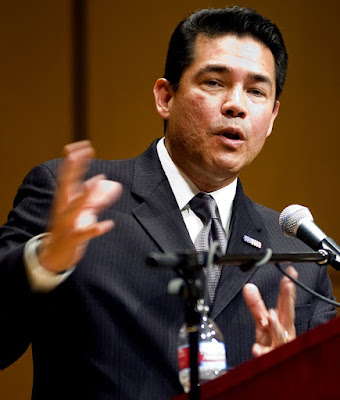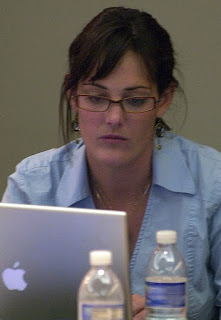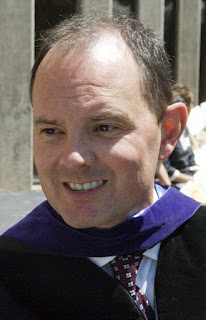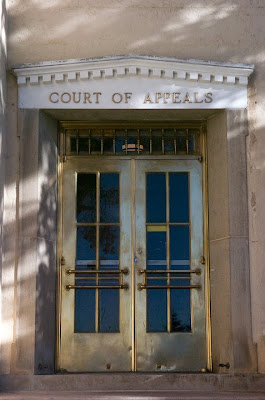 In a Press Release Wednesday June 1, 2011, Governor Susana Martinez announced today that she has made two appointments to the Judicial Nominating Committee that will make recommendations for the Court of Appeals seat being vacated by Judge Robert Robles.
In a Press Release Wednesday June 1, 2011, Governor Susana Martinez announced today that she has made two appointments to the Judicial Nominating Committee that will make recommendations for the Court of Appeals seat being vacated by Judge Robert Robles.Governor Martinez has named former Acting United States Attorney Gregory Fouratt, left, and former State Representative Justine Fox-Young to the committee.
The Governor's press release doesn't mention that there are 16 separate Judicial Nominating Committees; one each for the 13 judicial District Courts, and one each for the Supreme Court, the Court of Appeals, and one for the Bernalillo County Metropolitan Court, in Albuquerque.
The press release also doesn't mention where the former acting U.S. Attorney Greg Fouratt is today.
Because Fouratt is no longer the acting U.S. Attorney, having been replaced by Kenneth J. Gonzales, a U.S. Senate confirmed appointee of President Barack Obama, one might mistakenly believe he is no longer at the U.S. Attorney's office.
In part the press release reads:
Gregory Fouratt of Albuquerque served as a federal prosecutor before being named Acting United States Attorney for New Mexico in January 2008. He prosecuted the case against Manny Aragon, the former New Mexico State Senator who pleaded guilty to conspiracy and mail fraud as part of the 2007 Bernalillo County Metropolitan Courthouse construction scandal. Fouratt is a native of Roswell and a former Air Force Officer. He graduated from New Mexico State University.However, Fouratt is still an Assistant U.S. Attorney for the District of New Mexico, in the Albuquerque office.
 Fouratt was appointed acting U.S. Attorney by the Federal District Court Judges for the District of New Mexico, after his predecessor, David Iglesias, above, who was fired by the George W. Bush administration. Iglesias contended he was fired for not having been able to bring the case against Manny Aragon to an indictment before the 2006 mid-term elections.
Fouratt was appointed acting U.S. Attorney by the Federal District Court Judges for the District of New Mexico, after his predecessor, David Iglesias, above, who was fired by the George W. Bush administration. Iglesias contended he was fired for not having been able to bring the case against Manny Aragon to an indictment before the 2006 mid-term elections.As evidence mounted that Iglesias was fired for political, not performance related reasons, it was apparent that the Bush administration would not make a nomination and Fouratt was appointed to the acting role by the local judges.
The reason I asked is it appears the Hatch Act covers Fouratt.
The Hatch Act is a federal law, which prohibits U.S. government workers from being involved in political activities; at both federal, state, and local levels.
Fouratt meets the restrictions of who is covered by the act.
His appointment to the State's commission raises questions of things a US government employee may not do, which include:
endorse or oppose a candidate for political party office in a political advertisement, broadcast or campaign literature, if done in concert with the candidate, the political party or a partisan political group;The specific sections of interest in the Hatch Act are:
knowingly solicit or discourage the participation in any political activity of anyone who has business pending before their employing agency; or
Subpart C—Prohibited ActivitiesBy the mere fact that Governor Martinez announced the appointment of Fouratt as acting U.S. Attorney, and he still is an AUSA, raises questions of whether it places him in a violation.
§734.302 Use of official authority; prohibition.
(a) An employee may not use his or her official authority or influence for the purpose of interfering with or affecting the result of an election.
(b) Activities prohibited by paragraph (a) of this section include, but are not limited to:
(1) Using his or her official title while participating in political activity;
(2) Using his or her authority to coerce any person to participate in political activity; and
(3) Soliciting, accepting, or receiving uncompensated individual volunteer services from a subordinate for any political purpose.
[61 FR 35100, July 5, 1996]
Subpart D—Employees in Certain Agencies and Positions
§734.401 Coverage.
... (13) The Criminal Division of the Department of Justice;
 The duties of this Governor-appointed position is required under the Constitution of New Mexico, Article VI, Section 8,
The duties of this Governor-appointed position is required under the Constitution of New Mexico, Article VI, Section 8,The process to vet and make recommendations of lawyers to the Governor for appointment to judgeships of state courts is also found in Constitution of New Mexico, Article VI, Sections: 35 for the Appellate Courts.
Judgeships to state courts that fill vacancies not associated with elections, similar to the vacancy of the New Mexico Court of Appeals by the resignation of are first made by Governor appointment, then through open elections during the next state general election. After that judges stand for retention and must garner at least 57 percent of the votes cast to stay in office.
Judge Richard Robles was suspended by the Supreme Court after a DWI arrest in Albuquerque and removed him from the bench after after guilty. His retirement was effective June 1.
I sought a statement from U.S. Attorney Kenneth J. Gonzales regarding Greg Fouratt's appointment.
On Jun 2, 2011 Executive Assistant U.S. Attorney and Public Affairs Officer Elizabeth M. Martinez emailed a statement from Gonzales.
Statement by U.S. Attorney Kenneth J. Gonzales regarding Greg FourattI asked a follow up question about whether being appointed to a Judicial Nominating Committee for the State of New Mexico and its particularly unique method of selecting judges, part merit, part political created a problem with the Hatch act.
I encourage my entire staff to participate in outside activities approved by the Department of Justice, particularly those that serve the public good. Over the years, numerous Assistant U.S. Attorneys have been appointed to serve on state judicial nominating commissions, and they have served, capably and well. Governor Martinez made a good decision in appointing Greg Fouratt to the Judicial Nominating Commission that will help her fill a vacancy on the New Mexico Court of Appeals. Mr. Fouratt is well qualified for this appointment, and I have no doubt that he will serve the public well in this important capacity.
Repeated emails to Executive Assistant U.S. Attorney Public Affairs Officer Elizabeth M. Martinez asking questions about who in the Department of Justice reviewed, vetted, and approved the acceptance of Assistant US Attorney Greg Fouratt to sit on the New Mexico Judicial Nominating Commission and how that squares with the prohibitions of the Hatch Act, was met with promises of answers, but ultimately no response. A request for comment from Fouratt, through Martinez, also got no response. I waited as long as I could for the promised answer.
 So What’s Wrong With This picture?
So What’s Wrong With This picture?A federal employee may not be involved, by serving in other governments in making decisions about people who have, “business pending before their employing agency.”
Though Fouratt may only be part of a recommendation making process, the chances of encountering any lawyer who has business pending before the Department of Justice or the United States Attorney is highly likely.
 Martinez is entitled to appoint anyone she wants, like Fox-Young, right, and appointing people of like political persuasion is to be expected. However, she has an obligation of not putting appointees into positions of conflicts of interest or possible violations of law.
Martinez is entitled to appoint anyone she wants, like Fox-Young, right, and appointing people of like political persuasion is to be expected. However, she has an obligation of not putting appointees into positions of conflicts of interest or possible violations of law.She ultimately gets to select the judge from a list of names recommended by the Judicial Nominating Commission. If she is dissatisfied with the list, the Governor may ask for more names, but must chose from a name submitted by the commission.
The Governor's Constitutional duty to make appointments to judicial vacancies cannot be described as anything other than a political act, the kind the Hatch Act meant to prohibit federal employees from becoming entangled.
This is not an attack nor a commentary on the ability of the man, Greg Fouratt, or his skills as a lawyer, but it is based on his position as an Assistant United States Attorney for the District of New Mexico and the federal statutory restrictions on what any person in a similar position of federal employment as he is, may or may not do.
He is a hero amongst many state Republicans for having, as former Acting United States Attorney, compiled the cases against former Senate President Pro Tempore Manny Aragon and six other's for their involvement in corruption in the construction of the Bernalillo County Metropolitan Court building in Albuquerque. The seven all pleaded guilty.
Having Fouratt, a highly paid federal employee with a huge amount of power and influence sitting on the State's Judicial Nominating Committee, should be setting off all sorts of alarms, just from the appearance of possible conflict of interest standpoint.


The University of New Mexico's Law School Dean Kevin K. Washburn, is Chair of the Judicial Nominating Commissions.
 Washburn, right, seen here at the recent ceremonies of the 60th Law School graduating class of 2011, where he hosted his former boss, then Harvard Law School Dean, now U.S. Supreme Court Associate Justice Elena Kagan, who gave the commencement speech.
Washburn, right, seen here at the recent ceremonies of the 60th Law School graduating class of 2011, where he hosted his former boss, then Harvard Law School Dean, now U.S. Supreme Court Associate Justice Elena Kagan, who gave the commencement speech.Washburn probably has an obligation, as to make sure those who sit as members of the commission are not prohibited from sitting in possible violation of law.
It's not like there aren't more than a few non-governmental lawyers in this state, even a fair number of politically like minded ones, that the Governor could choose from.
In this economy, there must be some attorneys who would like the security of a reasonably well-paid job, a regular paycheck, health, and retirement benefits, to go along with the prestige of being a member of the judicial branch of government.
When there are vacancies requiring a Judicial Nominating Committee to sit. lawyers meeting the Constitutional qualifications are encouraged to make application for consideration.
Not withstanding the state rule about possible conflict of interest:
SECTION 3. Role of the Commissioners.The Hatch Act 's "knowingly solicit or discourage the participation in any political activity of anyone who has business pending before their employing agency; or," supersedes the state rule.
B. Each commissioner shall disclose to the commission all current or past professional, family, business, and other special relationships with any of the applicants. These relationships shall not disqualify a commissioner from participating unless the commissioner feels that he/she cannot be impartial and cannot comply with his/her oath of office as to any applicant.
 It is hard to imagine a pool of 10 to 20 applicants seeking to be the next justice to pass through the doors of the New Mexico State Court of Appeals, above, where one or more didn't have an issue before the Department of Justice. If there weren't, then the question of the qualification of the applicants range of experience might be questioned.
It is hard to imagine a pool of 10 to 20 applicants seeking to be the next justice to pass through the doors of the New Mexico State Court of Appeals, above, where one or more didn't have an issue before the Department of Justice. If there weren't, then the question of the qualification of the applicants range of experience might be questioned. Another problem is that again, as Governor Martinez did with appointing City of Albuquerque Chief Public Safety Officer Darren White, above, to the Judicial Standards Commission, She, is selecting an employee of an executive branch of a government, albeit, in this case the federal government, whereas White is a high ranking, first tier executive of city government, to oversee a coequal branch of government. The inclusion of a member of one branch of government into an oversight position of another branch, upsets the philosophical and actual constitutional checks and balances of our tripartite form of government.
Another problem is that again, as Governor Martinez did with appointing City of Albuquerque Chief Public Safety Officer Darren White, above, to the Judicial Standards Commission, She, is selecting an employee of an executive branch of a government, albeit, in this case the federal government, whereas White is a high ranking, first tier executive of city government, to oversee a coequal branch of government. The inclusion of a member of one branch of government into an oversight position of another branch, upsets the philosophical and actual constitutional checks and balances of our tripartite form of government. The final problem I perceive is that if there is a Hatch act violation, upon whom does the responsibility fall to investigate? Could it be the Department of Justice? Would US Attorney General Eric Holder's, above, DoJ even consider a cursory examination? Might I ever hear back from them? Too many questions, not enough answers. However, to me, it just doesn't look right.
The final problem I perceive is that if there is a Hatch act violation, upon whom does the responsibility fall to investigate? Could it be the Department of Justice? Would US Attorney General Eric Holder's, above, DoJ even consider a cursory examination? Might I ever hear back from them? Too many questions, not enough answers. However, to me, it just doesn't look right.